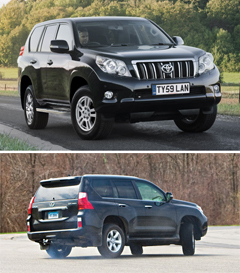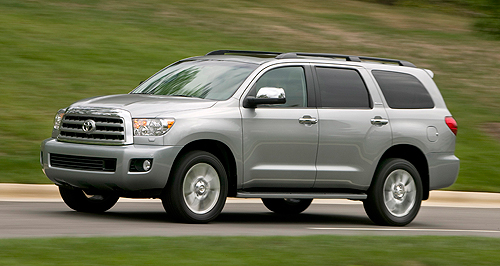News - ToyotaToyota widens stability control recall for SUVsThere's more: The American Toyota Sequoia has joined the recall list, along with the left-hand-drive Prado. Recall for Toyota SUVs now includes Sequoia and Prado overseas, but not in Australia29 Apr 2010 By TERRY MARTIN TOYOTA has recalled about 50,000 Sequoia SUVs in the US and 7500 LandCruiser Prado SUVs throughout Europe to adjust their electronic stability control (ESC) systems as the company attempts to answer every question over SUV safety in the wake of the global Lexus GX460 recall issued earlier this month. The safety recall for the new-generation 150-series Prado has not extended to Australia, or other right-hand drive markets, despite it having broadened from an international recall on the Prado-based V8-powered GX460 to all Prado models built in left-hand drive. According to Toyota, right-hand drive models have a different weight distribution and do not have the same issue with performance of the ESC under certain conditions. The company also says it has investigated and confirmed the results for all other SUVs, including the RAV4, “and found no problems” with ESC calibration. The latest SUV recalls were issued after an influential US-based consumer magazine branded the GX460 a “safety risk” that could be involved in a rollover crash because the ESC system did not intervene early enough. As GoAuto has reported, Consumer Reports magazine handed down a “don’t buy” verdict for the GX460 after experiencing a problem during its emergency handling tests. It said that when pushed to its limits, the rear of the GX “slid out until the vehicle was almost sideways before the electronic stability control system was able to regain control”.  Left: European LandCruiser Prado. Below: Lexus GX460. Left: European LandCruiser Prado. Below: Lexus GX460.Toyota engineers subsequently replicated the result, which prompted the company to issue a recall notice for about 9500 vehicles in the US and abroad. With the Sequoia SUV, Toyota will adjust the VDC (vehicle stability control) system in the opposite direction, responding to customer complaints – dating as far back as 2003 – that it is too aggressive and kicks in too early. The company said it had fixed the problem for those customers who had complained over the past seven years, but has waited until now to issue a recall. The Sequoia SUV is built at Toyota’s Princeton plant in Indiana, alongside the Highlander SUV (sold as the Kluger in Australia, but built in Japan for our market) and the Sienna people-mover. These vehicles are unaffected by the recall. “In vehicles without the upgrade, the VSC system could, in limited situations, activate at low speed – approximately 9mph (14km/h) – for a few seconds after acceleration from a stopped position and, as a result, the vehicle may not accelerate as quickly as the driver expects,” Toyota said in a statement. “There have been no reported injuries or accidents as a result of this condition. “Toyota instituted a running production change during the 2003 model year and published a Technical Service Bulletin to address this issue when it was first identified in fall (autumn) 2003. Since that time, Toyota has been responding to individual owner concerns by replacing the Skid Control Engine Control Unit in Sequoias impacted by this condition. “Of the approximately 50,000 vehicles included in this recall, approximately half have already been serviced under warranty.” In announcing the Sequoia recall this week, Toyota’s chief quality officer for North America, Steve St Angelo, said: “Toyota is committed to investigating customer complaints more aggressively and to responding quickly to issues we identify in our vehicles. As a result, we are voluntarily launching this recall to ensure that as many 2003 Sequoias as possible are serviced to the full satisfaction of our customers.” Toyota has recalled more than eight million vehicles worldwide in the past year for defects that might cause unintended acceleration in its cars and light commercial vehicles. It has also recalled its Prius hybrid in Australia and overseas to upgrade the software of its anti-lock braking system. While the latest recalls are continuing to damage Toyota’s reputation, and this week come as the annual BrandZ Top 100 survey of the world’s top automotive brands has Toyota losing top spot to BMW, the Japanese auto giant has also reported significant production and sales increases. Toyota and Lexus sales increased in Japan for the eighth consecutive month in March, helped by the top-selling Prius and a 200 per cent rise in the sale of Lexus models (to 4918 units), while exports increased for the third month in a row. In Japan, Toyota sold 209,510 vehicles last month (including Lexus but not Daihatsu and Hino), which was up 58.4 per cent on March 2009. It exported 161,831 vehicles, which was a 102.7 per cent rise on the same month last year, while overseas production reached 426,016 (up 83.8 per cent). Worldwide production for the month was up 96.7 per cent to 773,297 units. For the first quarter in this calendar year, Toyota’s sales were up 49.8 per cent to 480,157 units, while exports climbed 75.5 per cent to 1,146,300. Overseas production was up 75.5 per cent to 1,146,300 units, with worldwide production climbing a similar amount – 77.9 per cent for the quarter, to 2,072,402. Interestingly, for its financial year ending March 31, 2010, Toyota produced 7,278,659 vehicles worldwide (up 2.5 per cent) but, at last count, has recalled more than eight million.  Read more14th of April 2010  Toyota Prado not caught in US safety scareAustralian Prado not caught up in overseas safety issue, despite model similarities8th of April 2010  Toyota sells five million vehicles in OzFive million Toyotas sold Down Under but Japanese brand falls short of Ford, Holden |
Click to shareToyota articlesResearch Toyota Motor industry news |
















Facebook Twitter Instagram